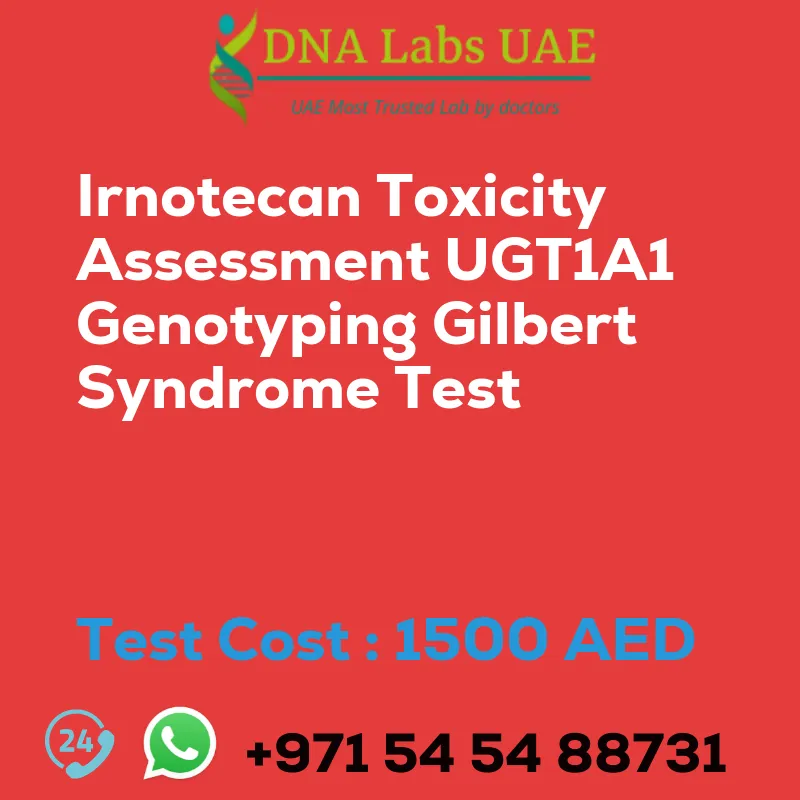Irnotecan Toxicity Assessment UGT1A1 Genotyping Gilbert Syndrome Test
Test Name: Irnotecan Toxicity Assessment UGT1A1 Genotyping Gilbert Syndrome Test
Components: EDTA Vacutainer (2ml)
Price: 1500.0 AED
Sample Condition: Peripheral Blood
Report Delivery: 7-8 days
Method: Sanger Sequencing
Test Type: Genetics
Doctor: Gynecologist
Test Department: Pre Test Information
Irnotecan Toxicity Assessment (UGT1A1 Genotyping)/ Gilbert Syndrome can be done with a Doctors prescription. Prescription is not applicable for surgery and pregnancy cases or people planning to travel abroad.
Test Details
Irnotecan is a chemotherapy drug used to treat various types of cancer, including colorectal cancer. However, it is known to cause severe side effects in some individuals due to its toxicity. One of the main factors contributing to the toxicity of irnotecan is the UGT1A1 enzyme, which is responsible for the metabolism and elimination of the drug from the body.
Genetic variations in the UGT1A1 gene can affect the activity of this enzyme, leading to decreased drug clearance and increased toxicity. One specific genetic variation associated with irnotecan toxicity is called Gilbert Syndrome. Gilbert Syndrome is a benign condition characterized by decreased UGT1A1 enzyme activity. People with Gilbert Syndrome have higher levels of bilirubin, a waste product of red blood cell breakdown, in their blood.
When irnotecan is administered to individuals with Gilbert Syndrome, the reduced UGT1A1 activity impairs the metabolism and elimination of the drug. This can lead to an accumulation of the active metabolite of irnotecan, known as SN-38, in the body. SN-38 is highly toxic and can cause severe side effects such as severe diarrhea, neutropenia (low white blood cell count), and potentially life-threatening myelosuppression (bone marrow suppression).
To assess the risk of irnotecan toxicity, UGT1A1 genotyping can be performed. This test determines the presence of genetic variations in the UGT1A1 gene, including the specific variation associated with Gilbert Syndrome. Individuals with Gilbert Syndrome are at a higher risk of developing severe side effects when treated with irnotecan, and alternative treatment options should be considered.
In clinical practice, UGT1A1 genotyping is commonly performed before administering irnotecan to patients. This allows healthcare providers to identify individuals at a higher risk of toxicity and adjust the treatment regimen accordingly. For example, a lower starting dose of irnotecan may be prescribed, or alternative treatment options may be considered altogether.
In conclusion, UGT1A1 genotyping, specifically for the Gilbert Syndrome variation, is an important tool in assessing the risk of irnotecan toxicity. It allows healthcare providers to personalize treatment plans and minimize the potential for severe side effects in individuals receiving irnotecan therapy.
| Test Name | Irnotecan Toxicity Assessment UGT1A1 Genotyping Gilbert Syndrome Test |
|---|---|
| Components | EDTA Vacutainer (2ml) |
| Price | 1500.0 AED |
| Sample Condition | Peripheral Blood |
| Report Delivery | 7-8 days |
| Method | Sanger Sequencing |
| Test type | Genetics |
| Doctor | Gynecologist |
| Test Department: | |
| Pre Test Information | Irnotecan Toxicity Assessment (UGT1A1 Genotyping)/ Gilbert Syndrome can be done with a Doctors prescription. Prescription is not applicable for surgery and pregnancy cases or people planing to travel abroad. |
| Test Details |
Irnotecan is a chemotherapy drug used to treat various types of cancer, including colorectal cancer. However, it is known to cause severe side effects in some individuals due to its toxicity. One of the main factors contributing to the toxicity of irnotecan is the UGT1A1 enzyme, which is responsible for the metabolism and elimination of the drug from the body. Genetic variations in the UGT1A1 gene can affect the activity of this enzyme, leading to decreased drug clearance and increased toxicity. One specific genetic variation associated with irnotecan toxicity is called Gilbert Syndrome. Gilbert Syndrome is a benign condition characterized by decreased UGT1A1 enzyme activity. People with Gilbert Syndrome have higher levels of bilirubin, a waste product of red blood cell breakdown, in their blood. When irnotecan is administered to individuals with Gilbert Syndrome, the reduced UGT1A1 activity impairs the metabolism and elimination of the drug. This can lead to an accumulation of the active metabolite of irnotecan, known as SN-38, in the body. SN-38 is highly toxic and can cause severe side effects such as severe diarrhea, neutropenia (low white blood cell count), and potentially life-threatening myelosuppression (bone marrow suppression). To assess the risk of irnotecan toxicity, UGT1A1 genotyping can be performed. This test determines the presence of genetic variations in the UGT1A1 gene, including the specific variation associated with Gilbert Syndrome. Individuals with Gilbert Syndrome are at a higher risk of developing severe side effects when treated with irnotecan, and alternative treatment options should be considered. In clinical practice, UGT1A1 genotyping is commonly performed before administering irnotecan to patients. This allows healthcare providers to identify individuals at a higher risk of toxicity and adjust the treatment regimen accordingly. For example, a lower starting dose of irnotecan may be prescribed, or alternative treatment options may be considered altogether. In conclusion, UGT1A1 genotyping, specifically for the Gilbert Syndrome variation, is an important tool in assessing the risk of irnotecan toxicity. It allows healthcare providers to personalize treatment plans and minimize the potential for severe side effects in individuals receiving irnotecan therapy. |








